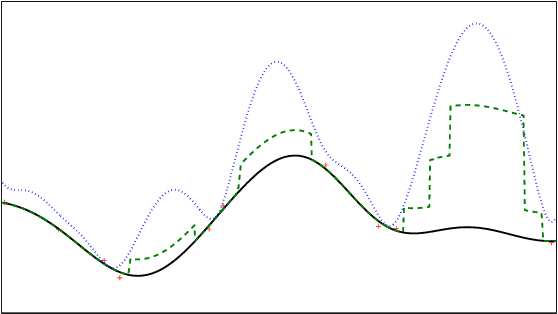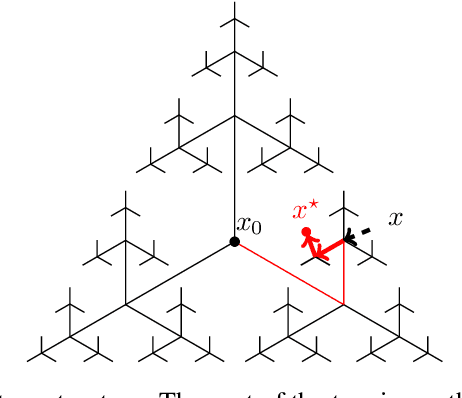Emile Contal
ICLERB: In-Context Learning Embedding and Reranker Benchmark
Nov 28, 2024Abstract:In-Context Learning (ICL) enables Large Language Models (LLMs) to perform new tasks by conditioning on prompts with relevant information. Retrieval-Augmented Generation (RAG) enhances ICL by incorporating retrieved documents into the LLM's context at query time. However, traditional retrieval methods focus on semantic relevance, treating retrieval as a search problem. In this paper, we propose reframing retrieval for ICL as a recommendation problem, aiming to select documents that maximize utility in ICL tasks. We introduce the In-Context Learning Embedding and Reranker Benchmark (ICLERB), a novel evaluation framework that compares retrievers based on their ability to enhance LLM accuracy in ICL settings. Additionally, we propose a novel Reinforcement Learning-to-Rank from AI Feedback (RLRAIF) algorithm, designed to fine-tune retrieval models using minimal feedback from the LLM. Our experimental results reveal notable differences between ICLERB and existing benchmarks, and demonstrate that small models fine-tuned with our RLRAIF algorithm outperform large state-of-the-art retrieval models. These findings highlight the limitations of existing evaluation methods and the need for specialized benchmarks and training strategies adapted to ICL.
RAGSys: Item-Cold-Start Recommender as RAG System
May 27, 2024


Abstract:Large Language Models (LLM) hold immense promise for real-world applications, but their generic knowledge often falls short of domain-specific needs. Fine-tuning, a common approach, can suffer from catastrophic forgetting and hinder generalizability. In-Context Learning (ICL) offers an alternative, which can leverage Retrieval-Augmented Generation (RAG) to provide LLMs with relevant demonstrations for few-shot learning tasks. This paper explores the desired qualities of a demonstration retrieval system for ICL. We argue that ICL retrieval in this context resembles item-cold-start recommender systems, prioritizing discovery and maximizing information gain over strict relevance. We propose a novel evaluation method that measures the LLM's subsequent performance on NLP tasks, eliminating the need for subjective diversity scores. Our findings demonstrate the critical role of diversity and quality bias in retrieved demonstrations for effective ICL, and highlight the potential of recommender system techniques in this domain.
Stochastic Process Bandits: Upper Confidence Bounds Algorithms via Generic Chaining
Feb 16, 2016Abstract:The paper considers the problem of global optimization in the setup of stochastic process bandits. We introduce an UCB algorithm which builds a cascade of discretization trees based on generic chaining in order to render possible his operability over a continuous domain. The theoretical framework applies to functions under weak probabilistic smoothness assumptions and also extends significantly the spectrum of application of UCB strategies. Moreover generic regret bounds are derived which are then specialized to Gaussian processes indexed on infinite-dimensional spaces as well as to quadratic forms of Gaussian processes. Lower bounds are also proved in the case of Gaussian processes to assess the optimality of the proposed algorithm.
Optimization for Gaussian Processes via Chaining
Oct 19, 2015


Abstract:In this paper, we consider the problem of stochastic optimization under a bandit feedback model. We generalize the GP-UCB algorithm [Srinivas and al., 2012] to arbitrary kernels and search spaces. To do so, we use a notion of localized chaining to control the supremum of a Gaussian process, and provide a novel optimization scheme based on the computation of covering numbers. The theoretical bounds we obtain on the cumulative regret are more generic and present the same convergence rates as the GP-UCB algorithm. Finally, the algorithm is shown to be empirically more efficient than its natural competitors on simple and complex input spaces.
Gaussian Process Optimization with Mutual Information
Jun 08, 2015



Abstract:In this paper, we analyze a generic algorithm scheme for sequential global optimization using Gaussian processes. The upper bounds we derive on the cumulative regret for this generic algorithm improve by an exponential factor the previously known bounds for algorithms like GP-UCB. We also introduce the novel Gaussian Process Mutual Information algorithm (GP-MI), which significantly improves further these upper bounds for the cumulative regret. We confirm the efficiency of this algorithm on synthetic and real tasks against the natural competitor, GP-UCB, and also the Expected Improvement heuristic.
Parallel Gaussian Process Optimization with Upper Confidence Bound and Pure Exploration
Sep 02, 2013



Abstract:In this paper, we consider the challenge of maximizing an unknown function f for which evaluations are noisy and are acquired with high cost. An iterative procedure uses the previous measures to actively select the next estimation of f which is predicted to be the most useful. We focus on the case where the function can be evaluated in parallel with batches of fixed size and analyze the benefit compared to the purely sequential procedure in terms of cumulative regret. We introduce the Gaussian Process Upper Confidence Bound and Pure Exploration algorithm (GP-UCB-PE) which combines the UCB strategy and Pure Exploration in the same batch of evaluations along the parallel iterations. We prove theoretical upper bounds on the regret with batches of size K for this procedure which show the improvement of the order of sqrt{K} for fixed iteration cost over purely sequential versions. Moreover, the multiplicative constants involved have the property of being dimension-free. We also confirm empirically the efficiency of GP-UCB-PE on real and synthetic problems compared to state-of-the-art competitors.
 Add to Chrome
Add to Chrome Add to Firefox
Add to Firefox Add to Edge
Add to Edge